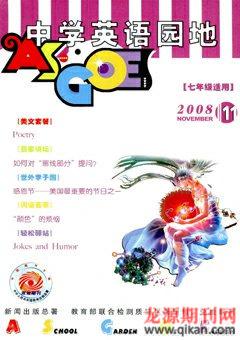新目标英语七年级(上)重点词语解析(Units8~9)
沈 浩
Unit 8When is your birthday?
1. date n. 日期,日子
Use your own name, age and date of birth. (P49) 使用你自己的名字,年龄和出生日期。
[解析] date与day的比较:
date意为“日期”,指具体的“(几月)几号”。例如:
I cant see the date on the letter. 我看不清信上的日期。
Do you know the date of your mothers birthday? 你知道你妈妈的生日吗?
day可以作“日”、“天”或“星期几”解,还可以作“白天”讲,这时,它的反义词为night。 days是“day”的复数形式。例如:
There are seven days in a week. 一周有七天。
They work all day and all night. 他们整日整夜地工作。
注意:对周几提问时,用“What day ...?”; 对几月几号提问时,用“Whats the date ...?”。 例如:
—What day is it today? 今天星期几?
—Its Sunday. 星期天。
—Whats the date today? 今天是几月几号?
—Its September 10th, Teachers Day. 今天是九月十号,教师节。
2. old adj. 年老的,老的
How old are you? (P49) 你多大了?
Im fifteen years old. (P51) 我15岁。
[解析] old与age的比较:
二者都可用来表示“年龄”,但old是形容词, age是名词。询问对方年龄时可用“How old are you?”或“Whats your age?”。例如:
—Whats your age? 你多大了? —Its ten. 我十岁了。
表示“……多大岁数”时,可用“be + 基数词 + year/years old”结构,而age不能替代old。 试译:我妈妈40岁了。
误: My mother is forty years age.
正: My mother is forty years old.
表达“某人年老”时可用“sb + be + old”, 不可用“sbs age is old”。 试译:奶奶很老了。
误: My grandmas age is very old.
正: My grandma is very old.
at the age of意为“在……岁数”。例如:
I could swim at the age of eight. (= I could swim when I was eight years old.) 我八岁时就会游泳。
3. music n. 音乐,乐曲
She likes listening to music. 她喜欢听音乐。
Many people like his music. 许多人喜欢他谱写的乐曲。
[解析] music是不可数名词, a piece of music表示“一首乐曲”。泛指音乐时, music前面不加冠词,但特指某段乐曲时,其前要加限定词。例如:
Young people like pop music. 年轻人喜欢流行音乐。
He loves music. 他热爱音乐。
This piece of music is wonderful. 这首乐曲很好听。
4. festival n. 节、节日
Do you have an Art Festival? (P51) 你们有艺术节吗?
[解析] festival一般指历史悠久的传统节日,如我国的春节、中秋节以及国外的圣诞节等,也可指定期举办的艺术节、戏剧节、音乐节等。例如:
In China, the Spring Festival is one of the most important festivals of a year. 在中国,春节是一年中最重要的节日之一。
There is a film festival here this year. 今年这儿有一个电影节。
Christmas is one of the Christian festivals. 圣诞节是基督教的节日之一。
5. party n. 聚会,晚会
When is Sallys birthday party? (P50) 萨莉的生日聚会是什么时候?
[解析] party是可数名词,常用来表示娱乐性、庆祝性或社交性的“聚会”、“晚会”或“茶话会”等,而不是讨论问题的会议。例如:
welcome party欢迎会; birthday party生日宴会; tea party茶话会
I hope you can come to my birthday party next Sunday. 我希望你下周日能光临我的生日聚会。
注意: the Party(第一个字母大写)特指“中国共产党”。例如:
We love the Party. 我们热爱中国共产党。
Unit 9Do you want to go to a movie?
1. favorite adj. 最喜欢的
My favorite actor is Paul Jackson. (P57) 我最喜欢的演员是保罗·杰克逊。
Who is your favorite teacher? 谁是你最喜欢的老师?
[解析] favorite意为“最喜欢的……”。例如:
This is my favorite book. 这是我最爱读的书。
Oranges are my favorite fruit. 柑橘是我最喜欢吃的水果。
favorite作形容词时,本身含最高级的意义,所以不能再在其前加very或most等修饰词。试译:你最喜欢的颜色是什么?
误: Whats your most favorite color?
正: Whats your favorite color?
2. exciting adj. 令人兴奋的,使人激动的
She thinks they are most exciting. (P56) 她认为它们很令人兴奋。
His exciting speech often makes us very excited. 他激动人心的演讲经常使我们兴奋不已。
[解析] exciting与excited的比较:
exciting(令人兴奋/激动的)是由动词excite的现在分词演变而来的形容词,在句中作表语或定语,其主语多为表示事物的名词。例如:
The news is exciting. 这消息激动人心。
That is an exciting trip. 那是一次令人兴奋的旅行。
excited是形容词,意为“兴奋的、激动的、感到兴奋的”,在句中作表语,主语一般是人。例如:
We are very excited to hear of your success. 听说你们获得了成功,我们非常兴奋。
Are you excited about going to Beijing? 要去北京了,你感到激动吗?
3. on weekends在周末
He often goes to see Beijing Opera on weekends. (P57) 他周末经常去看京剧。
[解析] on weekends(也可以说at the weekend(s))意为“在每个周末”。 on the weekend意为“在那个周末”,指说话双方都明白的、特定的那个周末。如果weekend前有this/that/next等修饰语,则要省略介词on。 例如:
I am always busy on weekends. 我周末总是很忙。
I will go to Beijing this weekend. 这个周末我打算去北京。
on weekdays指“在工作日、在平日(指从星期一到星期五正常上班、工作的日子)”。若weekday前有this/that/next等修饰语,则也要省略介词on。 例如:
Dont watch TV on weekdays. 不要在工作日看电视。
4. with prep. 和……一起
She often goes to see Beijing Opera with her father. (P56) 她经常和她爸爸一起去看京剧。
[解析] with是介词,意为“和……一起”。例如:
Come with me. 跟我来。
He likes to live with his parents. 他喜欢和父母住在一起。
with还有“带有”、“有着”的含义。例如:
China is a country with a long history. 中国是一个历史悠久的国家。
Please take an umbrella with you. 请随身带把伞去。
5. funny adj. 有趣的
He is a very funny man. 他是个非常有趣的人。
[解析] funny与interesting的比较:
funny是形容词,意为“有趣的、令人愉快的、滑稽可笑的”,它也有“稀奇古怪的”的意思。例如:
I often hear such a funny joke. 我经常听到这样一个有趣的笑话。
There is something funny about this. 这事有点古怪。
interesting是形容词,意为“令人感兴趣的”。作表语用时,主语通常是物;作定语用时,既可修饰人也可修饰物。例如:
I find English interesting. 我发现英语很有趣。
The film is very interesting. 那部电影很有趣。
This is an interesting story book. 这是一本有趣的故事书。

